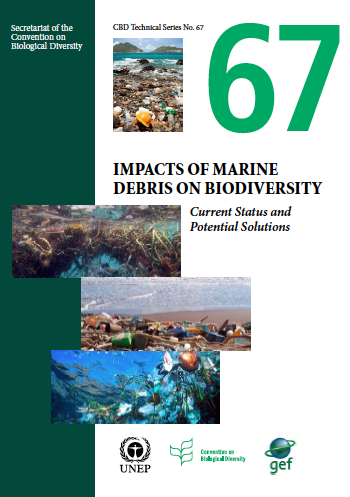The report from the CBD and GEF STAP suggests that even the best waste management practices may be insufficient to address the current marine debris challenge on a global scale, and says there is a need for wider scale adoption of "green chemistry," environmentally friendly design and other complementary up-stream innovations to reduce the potential for items to become marine debris.
 September 2012: The Secretariat of the Convention on Biological Diversity (CBD), in collaboration with the Scientific and Technical Advisory Panel (STAP) of the Global Environment Facility (GEF), published a study on the impacts of marine debris on biodiversity, and suggesting strategies to address the challenge. The report focuses on four impact categories: entanglement and ingestion, including microplastics; dispersal via rafting; provision of new habitat; and ecosystem-level effects.
September 2012: The Secretariat of the Convention on Biological Diversity (CBD), in collaboration with the Scientific and Technical Advisory Panel (STAP) of the Global Environment Facility (GEF), published a study on the impacts of marine debris on biodiversity, and suggesting strategies to address the challenge. The report focuses on four impact categories: entanglement and ingestion, including microplastics; dispersal via rafting; provision of new habitat; and ecosystem-level effects.
The study, titled “Impacts of marine debris on biodiversity: current status and potential solutions,” and published as CBD Technical Series No. 67, reviews and synthesizes literature to describe the impact of marine debris on biodiversity. The report suggests that at present, even the best waste management practices may be insufficient to address the marine debris challenge on a global scale, and says there is a need for wider scale adoption of “green chemistry,” environmentally friendly design and other complementary up-stream innovations to reduce the potential for items to become marine debris.
The assessment provides examples of proactive policies and programmes that have been successfully used in waste management and recycling, and which could be applied to reduce land-based sources of marine debris. [Publication: Impacts of Marine Debris on Biodiversity: Current Status and Potential Solutions]